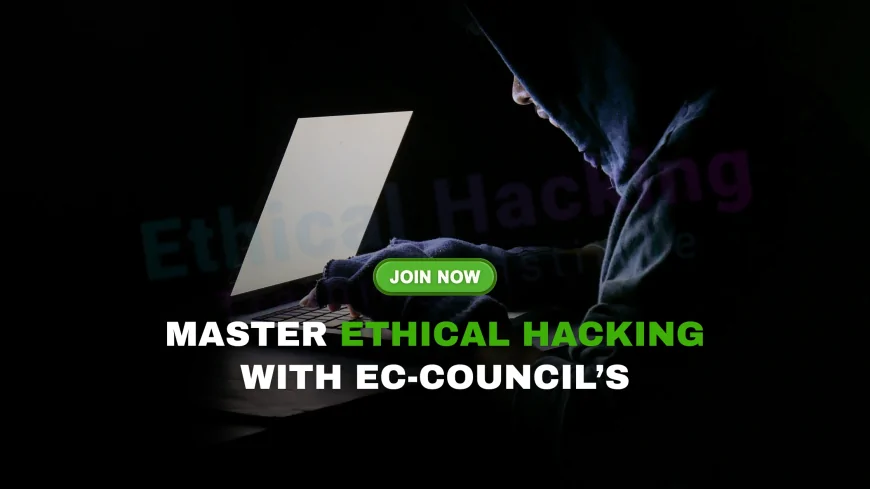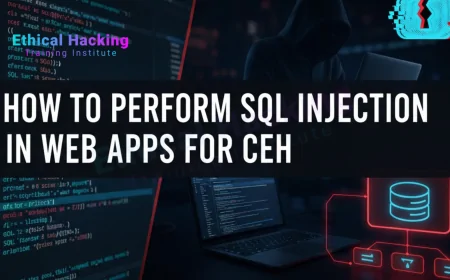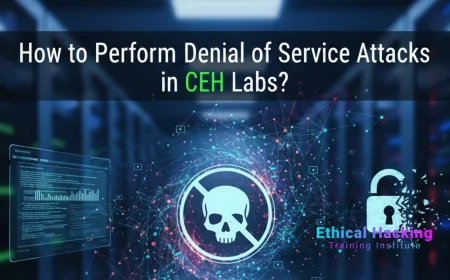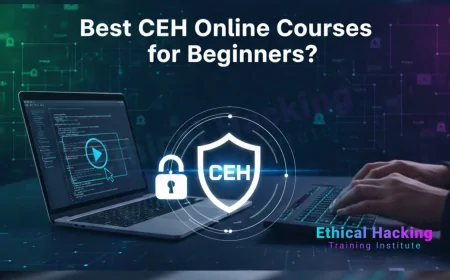EC Council Certified Ethical Hacker Certification: The Ultimate Cybersecurity Credential | CEH Certification by EC-Council: Elevate Your Cybersecurity Credentials
Explore the EC Council Certified Ethical Hacker (CEH) certification. Learn how CEH helps you master ethical hacking, enhance your cybersecurity career, and stay ahead with v13 AI-powered training and labs.

Table of Contents
- Introduction
- What Is the CEH Certification?
- Why Choose CEH?
- Enrollment & Eligibility Paths
- Training Options & Costs
- Exam Structure & AI v13 Updates
- Hands-On Labs & CEH Master Path
- Career Impact & Industry Recognition
- Preparation Strategies
- Continuing Education & Recertification
- FAQs
- Conclusion
Introduction
The Certified Ethical Hacker (CEH) certification from EC Council is one of the most prestigious credentials in cybersecurity. It validates your ability to think and act like a hacker—ethically—to identify vulnerabilities before malicious actors exploit them. With over 200,000 certified professionals worldwide, CEH is recognized in government, corporate, and consulting roles.
What Is the CEH Certification?
The CEH credential is ANSI/ISO 17024-accredited, aligning with U.S. DoD Standards (8570/8140). It demonstrates proficiency in penetration testing, threat analysis, network defense, and real-world exploitation. CEH curriculum covers 20 domains including footprinting, scanning, system hacking, web app attacks, wireless, malware, cryptography, and more.
Why Choose CEH?
The Certified Ethical Hacker (CEH) certification from EC-Council is one of the most respected and recognized credentials in the cybersecurity industry. It’s specifically designed for professionals who want to demonstrate and validate their skills in ethical hacking, penetration testing, and information security. Here’s why thousands of cybersecurity professionals and employers choose CEH:
- Globally Recognized Credential: CEH is ANSI accredited, mapped to the NICE 2.0 Framework, and recognized by the U.S. Department of Defense (DoD 8140/8570). It’s accepted across over 140 countries.
- Comprehensive Skill Coverage: CEH covers 20+ domains including network scanning, system hacking, cryptography, cloud and IoT security, malware threats, and emerging topics like AI attacks and defenses.
- Hands-On Training with Real-World Scenarios: The program includes access to CyberQ labs, offering 350+ exercises that simulate real-world hacking situations. These labs are essential for mastering practical skills.
- Updated for the Modern Threat Landscape: CEH v13 includes content on deepfakes, cloud-based attacks, ransomware, AI-driven exploits, and threat modeling, ensuring you're equipped for today’s and tomorrow’s security challenges.
- Career Advancement Opportunities: CEH helps professionals step into roles such as Penetration Tester, Security Analyst, SOC Analyst, Red Team Operator, or even CISO. It opens doors in government, consulting, and enterprise sectors.
- Strong ROI for Employers: Organizations that invest in CEH-certified professionals benefit from reduced security incidents, better compliance readiness, and stronger cybersecurity posture overall.
Whether you're just starting in cybersecurity or looking to validate and formalize your offensive security skills, CEH is a powerful and practical step forward. It's more than a certificate—it's proof of your ability to ethically think like a hacker.
Enrollment & Eligibility Paths
- Training path: No experience required if enrolled via an authorized EC Council training provider (online or in-person).
- Eligibility path: Apply for the exam using documented info-sec experience (≥2 years) through EC Council directly.
- Academic & scholarship routes: University partnerships and Hero Scholarships offer subsidized training and vouchers.
Training Options & Costs
Training formats include:
- Self-paced on-demand: ₹35,000–₹45,000 (videos, e‑books, labs)
- Instructor-led online: ₹65,000–₹85,000 (live classes, lab + exam voucher)
- ATC in-person: Up to ₹95,000 (hands-on, in-person labs, quick pass rates)
- Bundles: Some providers offer EMI, job placement, or repeat exam allowance.
Exam Structure & AI v13 Updates
The CEH v13 exam consists of 125 MCQs (4 hours). Passing score ranges from 60–85% depending on exam version. Notably, v13 includes AI modules covering:
- AI-assisted reconnaissance and exploit planning
- Polymorphic malware, deepfakes, AI phishing tactics
- Defensive AI for threat hunting and anomaly detection
Hands-On Labs & CEH Master Path
One of the standout features of the EC-Council's Certified Ethical Hacker (CEH) program is its emphasis on practical, hands-on learning. Understanding theory is important, but real-world application is what separates top ethical hackers from the rest. That’s where CyberQ Labs and the CEH Master Path come in.
CyberQ Labs: Realistic Ethical Hacking Practice
CyberQ, formerly known as iLabs, is EC-Council’s cloud-based lab environment designed to immerse students in real-world cyberattack scenarios. With over 350+ guided exercises and challenges, learners can simulate network attacks, exploit vulnerabilities, and secure systems using professional tools.
- Scenarios Based on Real Attacks: Simulate reconnaissance, enumeration, system hacking, sniffing, malware analysis, and more.
- Tool-Based Labs: Use industry-standard tools like Metasploit, Nmap, Burp Suite, Wireshark, John the Ripper, and Hydra.
- Step-by-Step Guidance: Labs include walk-throughs for beginners and advanced challenges for experienced users.
- Cloud-Based Access: No need to set up your own VM environment—labs run on EC-Council’s secure cloud infrastructure, accessible 24/7.
CEH Master Path: Prove Your Practical Skills
For those looking to go beyond the written exam, EC-Council offers the CEH Master designation. This advanced certification track includes the original CEH knowledge-based exam (125 multiple-choice questions) plus a separate 6-hour practical exam.
CEH Practical Exam Overview:
- Duration: 6 hours
- Environment: Live hacking labs
- Objectives: Perform a penetration test, exploit systems, identify vulnerabilities, and document findings
- Scoring: Must demonstrate successful exploitation of a range of scenarios to pass
Benefits of the CEH Master Credential
- Demonstrates Real-World Competency: Proves that you're not just exam-smart, but field-ready.
- Preferred by Employers: Companies value candidates with hands-on experience in complex, simulated environments.
- Builds Confidence: Working through real challenges boosts problem-solving and analytical thinking skills.
Whether you're aiming to enhance your resume, prepare for a high-stakes job role, or prove yourself as a skilled ethical hacker, combining CEH with the CEH Master path and CyberQ labs is the most practical, results-driven way to stand out in the cybersecurity industry.
Preparation Strategies
- Map training content to CEH blueprint
- Use virtual labs daily to cement skills
- Participate in CTFs and GitHub or blog your progress
- Join communities, forums, and mentor groups
- Revise with mock tests and flashcards weekly
Continuing Education & Recertification
CEH remains valid for three years. Renewal requires:
- 120 Continuing Professional Education credits
- Annual EC Council membership (~$85)
- Or retaking the exam
FAQs -
1. What is CEH?
CEH certifies ethical hacking and penetration testing skills aligned with DoD and international standards.
2. Is CEH recognized globally?
Yes; it's ANSI/ISO accredited and DoD-compliant.
3. What's new in CEH v13?
Incorporates AI attack and defense modules and enhanced CyberQ labs.
4. How do I enroll?
Enroll via training partner (no experience needed) or apply directly with ≥2 years InfoSec.
5. How much does training cost?
Between ₹35,000–₹95,000 depending on format and provider.
6. What tools are taught?
Nmap, Metasploit, Wireshark, Burp, Hydra, John the Ripper, and many more.
7. How long is the exam?
Four hours, 125 questions.
8. What is CEH Practical?
A six-hour lab exam that tests real-world penetration testing skills tailored for CEH Master status.
9. What roles can I pursue?
Penetration Tester, SOC Analyst, Red Team member, etc.
10. What is a good salary?
$70K–120K+ with experience and regional adjustments.
11. Is CEH harder than OSCP?
CEH is more structured; OSCP requires building exploits from scratch and is more rigorous technically.
12. Do labs cost extra?
Lab access is usually bundled; standalone access often adds ₹10k–₹15k.
13. Can I self-study?
Yes—if you meet the experience requirement and apply for the exam with EC Council.
14. How do I recertify?
Earn CPEs or retake the exam every three years.
15. Is CEH worth it?
Yes – it opens doors to government and private orgs and demonstrates hands-on expertise.
16. Is there an age limit?
No—but candidates must meet eligibility or attend training.
17. Do students get discounts?
Yes—through academic partnerships and scholarships.
18. What languages is CEH offered?
English; select ATCs may offer local language support.
19. Can CEH help if I work remote?
Yes—it supports roles like remote consultants, penetration testers, and SOC analysts.
20. What comes after CEH?
Advanced certs like OSCP, CCSP, CISSP, and specialized paths like cloud or IoT security.
Conclusion
The EC Council’s Certified Ethical Hacker certification offers a globally recognized pathway to becoming a skilled, professional ethical hacker. Whether through self-study or official training, CEH v13 stands as a powerful credential that offers both theory and practice—backed by AI-aware content and tangible career outcomes. For cybersecurity enthusiasts seeking authority, employability, and mastery in defense and offense, CEH is the ultimate certification.
What's Your Reaction?
 Like
0
Like
0
 Dislike
0
Dislike
0
 Love
0
Love
0
 Funny
0
Funny
0
 Angry
0
Angry
0
 Sad
0
Sad
0
 Wow
0
Wow
0


















